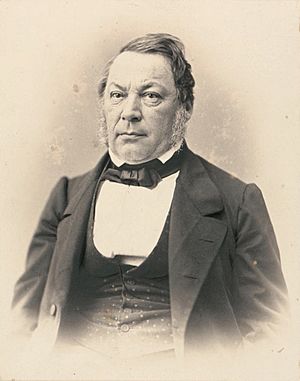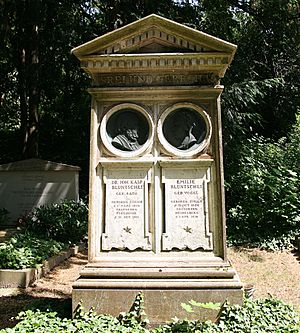Johann Kaspar Bluntschli facts for kids
Quick facts for kids
Johann Kaspar Bluntschli
|
|
|---|---|
 |
|
| Born | 7 March 1808 |
| Died | 21 October 1881 (aged 73) Karlsruhe, Germany
|
| School | German Historical School |
|
Main interests
|
International law, constitutional law, forms of the state |
|
Influences
|
|
|
Influenced
|
|
Johann Caspar Bluntschli (born March 7, 1808, died October 21, 1881) was an important Swiss jurist (a legal expert) and politician. He helped create some of the first rules for international law and how wars should be fought. He worked with other thinkers like Francis Lieber and Édouard René de Laboulaye.
Contents
Early Life and Education
Johann Caspar Bluntschli was born in Zürich, Switzerland. His father made soap and candles. After school, he studied law and political science in Zürich. He then went to universities in Berlin and Bonn. In 1829, he earned his law degree.
Political Career in Switzerland
When he returned to Zürich in 1830, Bluntschli became very active in politics. At that time, many Swiss areas (called cantons) were having political problems. He wrote a book called On the Constitution of the City of Zürich. He also wrote The People and the Sovereign in 1830. In this book, he supported a government based on a constitution. However, he did not like the growing radical (very extreme) political ideas in Switzerland.
In 1837, he was chosen to be a member of the Great Council (a main governing body). He became a leader for the moderate conservative party. This party wanted to keep some traditions but also allow for changes.
Bluntschli was interested in the ideas of a philosopher named Friedrich Rohmer. He tried to use Rohmer's ideas to solve Switzerland's political problems. However, his strong opinions against both radical and very traditional religious views made him many enemies. He had been elected president of the council but had to resign.
After a conflict called the Sonderbund War ended in 1847, Bluntschli saw that his party had lost its power. He left Switzerland and moved to Munich, Germany.
Work in Germany
In 1848, Bluntschli became a professor of constitutional law at the Ludwig Maximilian University in Munich. In Germany, his political views became more liberal. He developed an important theory about the state, which influenced many German and American liberals.
He wrote several important books during this time:
- General State Law (1851–1852)
- Theory of the Modern State (1875–1876)
- He also worked with Karl Ludwig Theodor Brater on a large dictionary of German state law.
Bluntschli also worked on a legal code for the canton of Zürich. This code, especially the part about contracts, was used as a model for laws in other places.
Later Years and International Law
In 1861, Bluntschli moved to Heidelberg to teach constitutional law. He again became involved in politics. He wrote History of General State Law and Politics (1864). He wanted to help Germans understand politics better and get rid of old prejudices.
Bluntschli was also a Freemason. In 1865, he wrote a public letter against a statement from Pope Pius IX. During the Austro-Prussian War of 1866, he worked to keep his new home, Baden, neutral.
From this time on, Bluntschli focused on international law. This is the set of rules that countries agree to follow when dealing with each other. His most famous works in this area include:
- The Modern Law of War (1866)
- The Modern International Law of Civilized States (1868)
- The Law of Prize in War (1878)
These books are still important for studying international law. He also wrote about the Alabama Claims, a dispute between the United States and Great Britain after the American Civil War. His ideas on war laws were shaped by his letters with Francis Lieber, a German who moved to the United States.
In 1873, Bluntschli helped start the Institute of International Law in Ghent. He also represented the German emperor at a conference in Brussels about international war laws. He discussed topics related to International Humanitarian Law and the Red Cross with other important figures.
Bluntschli was elected a foreign member of the Royal Netherlands Academy of Arts and Sciences in 1875. He died suddenly in Karlsruhe on October 21, 1881. His large collection of books was bought by Johns Hopkins University.
Other Works
Besides the books mentioned earlier, Bluntschli also wrote:
- German Private Law (1853–1854)
- German State Theory for Educated People (1874)
- German State Theory and Today's World of States (1880)
See also
 In Spanish: Johann Caspar Bluntschli para niños
In Spanish: Johann Caspar Bluntschli para niños
 | Valerie Thomas |
 | Frederick McKinley Jones |
 | George Edward Alcorn Jr. |
 | Thomas Mensah |


